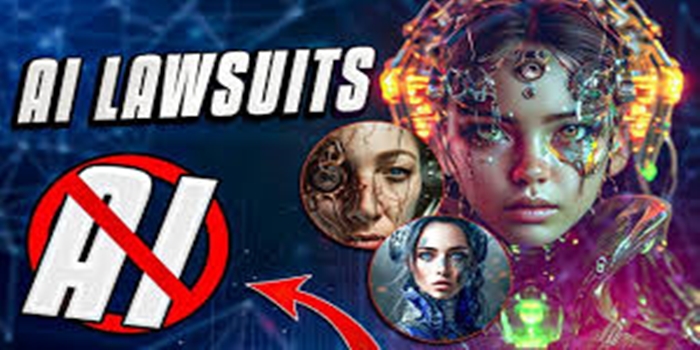In this blog, we discussed the meaning of AI- generated lawsuits, the Issues, the examples, the futures, legal challenges and Outcomes.
Definition
“AI-generated lawsuits” refers to lawsuits filed in response to the use of artificial intelligence, particularly generative AI models, in ways that are perceived as invading on copyright, privacy, or other legal rights. These lawsuits are typically filed against the companies that develop and deploy these AI systems.
Issues in AI-Generated Lawsuits:
Copyright Infringement:
Many lawsuits claim that AI companies have used copyrighted works to train their models, leading to AI-generated outputs that infringe on the original creators’ rights.
Fair Use:
AI companies often argue that their training practices fall under fair use, allowing for the use of copyrighted material for transformative purposes like building AI models.
Ownership of AI-Generated Content:
Questions arise regarding who owns the copyright to content generated by AI, particularly when the AI is trained on copyrighted material.
Data Privacy and Data Security:
Concerns exist about the privacy of data used to train AI models and the potential for misuse or unauthorized access.
Algorithmic Bias:
AI models trained on biased data can perpetuate and amplify existing societal inequalities, leading to legal challenges related to discrimination.
Trade Secrets and Intellectual Property:
The development of AI models can involve proprietary algorithms and intellectual property, which can be subject to legal protection and litigation.
Consumer Protection:
Concerns are raised about the potential for AI to deceive consumers or mislead them about the origin of AI-generated content.
Here are some Examples of AI-generated lawsuits:
Copyright Infringement:
Getty Images v. Stability AI:
Getty Images sued Stability AI (the company behind Stable Diffusion) for using their copyrighted images to train its AI models without permission.
Authors Guild v. OpenAI:
The Authors Guild sued OpenAI, claiming copyright infringement as ChatGPT was trained on millions of copyrighted works without permission.
New York Times v. OpenAI, Microsoft:
The New York Times sued OpenAI and Microsoft, alleging they used the newspaper’s articles without permission to train ChatGPT and other AI models.
Kadrey v. Meta:
A lawsuit against Meta was allowed to proceed, alleging that Meta infringed on authors’ intellectual property rights by using their works to train AI models.
Defamation and Misinformation:
Mark Walters v. OpenAI:
A lawsuit was filed against OpenAI after ChatGPT falsely accused a radio host of embezzling funds.
Grok AI False Accusation:
Grok, an AI chatbot, falsely accused NBA star Klay Thompson of vandalism, highlighting the potential for AI-generated misinformation.
Misuse of Personal Data:
Lovo’s Class Action Lawsuit:
A class action lawsuit was filed against LOVO, alleging the company used AI voiceover technology to copy actors’ voices without permission.
Potential India Media Lawsuit vs. Microsoft:
Microsoft’s LinkedIn was sued by Premium customers who alleged the platform disclosed their private messages to third parties to train generative AI models.
Other Examples:
Thomson Reuters v. Ross Intelligence:
Thomson Reuters sued Ross Intelligence for using materials from Westlaw to train their AI-driven legal research engine.
Music Publishers v. Anthropic:
Music publishers sued Anthropic, claiming the company used copyrighted music lyrics to train its AI model Claude.
Universal Music, Music-Z Songs, ABKO Music Inc et al v. Anthropic PBC:
Universal and other music publishers are suing Anthropic for unlawful use of their intellectual property as training data.
Bartz v. Anthropic:
Writers and journalists sued Anthropic, alleging the company misused their works to train its chatbot Claude.
The Future of AI-Generated Lawsuits:
Copyright Infringement:
AI models are being trained on vast datasets of copyrighted material, leading to concerns about whether the models themselves are infringing on intellectual property.
Fair Use:
The concept of fair use, which allows limited use of copyrighted material without permission, is being debated in the context of AI, particularly for training datasets.
New Legislation and Regulation:
Lawmakers and regulators are actively considering new legislation to address AI and copyright, such as the Generative AI Copyright Disclosure Act of 2024.
Legal Battles and Outcomes:
Ongoing lawsuits, like those involving OpenAI and Stability AI, will shape how courts interpret copyright law in the age of AI.
Evolving Legal Landscape:
The legal framework surrounding AI and copyright is constantly evolving, with the potential for new precedents and regulations.
Impact on the Legal Profession:
Increased Legal Expertise:
Lawyers will need to specialize in AI-related legal issues, including copyright, intellectual property, and emerging regulations.
Data-Driven Litigation:
AI algorithms can help predict legal outcomes and analyze data to strengthen cases, influencing litigation strategies.
Ethical Considerations:
AI raises ethical considerations related to bias, fairness, and accountability in legal processes.
Looking Ahead:
Court Decisions:
Court decisions in ongoing cases will provide clarity on how copyright law applies to AI-generated content and training datasets.
Regulation and Legislation:
New laws and regulations may emerge to address the specific challenges posed by AI, potentially balancing innovation with intellectual property rights.
Continued Evolution:
The legal landscape surrounding AI and copyright will continue to evolve as AI technology advances.
Legal Challenges and Outcomes:
Substantial Similarity:
Courts often focus on whether the AI-generated outputs are substantially similar to the copyrighted works, a key factor in determining copyright infringement.
Fair Use Doctrine:
AI companies often rely on the fair use doctrine to defend their training practices, but courts are interpreting this doctrine in the context of AI technology.
De-identification of AI Models:
AI models are often trained on vast datasets, and the de-identification of copyrighted works in these datasets is a complex legal issue.
Class Action Lawsuits:
Some AI-generated lawsuits have been filed as class actions, allowing multiple plaintiffs to sue AI companies on behalf of a group of similarly affected individuals.
Conclusion
AI-generated lawsuits are legal actions stemming from the use of artificial intelligence, particularly concerning copyright, fair use, and the ownership of AI-generated content. These lawsuits primarily target AI companies, questioning the legality of their practices, including training AI models on copyrighted material without explicit permission and the ownership of AI-generated outputs.

